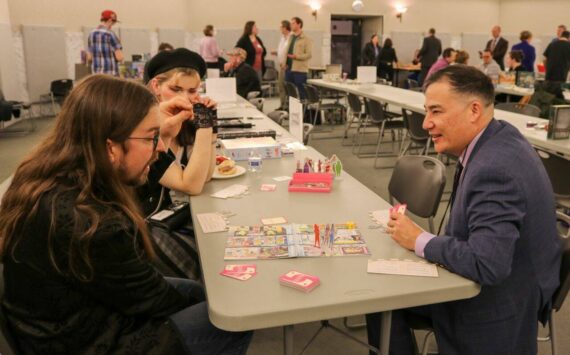Does prohibition ever work?
By Morf Morford
Tacoma Daily Index
I have two philosophical principles when it comes to drugs; first, drugs should be regulated, outlawed or controlled based on how dangerous or addictive they are and, second, the legal punishment for use of any given drug should never be more destructive than the effects of the drug itself.
To my mind, these seem like reasonable, if not obvious guidelines that would be the foundation of any fair and functional legal system regarding any governments involvement in drug control and enforcement.
You don’t need to be a legal analyst or researcher to know that our drug laws (and those of other countries and states) are arbitrary, inconsistent and contradictory.
Within our national boundaries for example, a gram or so of marijuana (cannabis) varies between completely legal and a felony.
In Alabama, possession of a tiny amount of marijuana (even one joint) can earn you serious jail time – at least if you are male and non-white.
As of October of 2016, 178 black males were in prison on a charge of first degree possession of marijuana, with zero black females, two white females and 39 white males. (1*)
Most legal and political observers are convinced that Alabama will be the last state to legalize marijuana https://www.al.com/news/birmingham/2017/02/legal_marijuana_is_it_coming_t.html
Meanwhile, in the rest of the country, abut 60% of us support legalization of marijuana for personal recreational use (74% of Millennials). Eleven states – and Washington, D.C have legalized marijuana for adult personal recreational use (https://www.pewresearch.org/fact-tank/2019/06/26/facts-about-marijuana/).


Countries that have legalized the medical use of cannabis include Argentina, Australia, Canada, Chile, Colombia, Croatia, Cyprus, Germany, Greece, Israel, Italy, Lithuania, Luxembourg, North Macedonia, Norway, the Netherlands, New Zealand, Peru, Poland, Switzerland, and Thailand.
Uruguay and Canada are the only sovereign states that have fully legalized the consumption and sale of recreational cannabis nationwide.
Portugal, after years of expense and lack of any measurable, enduring success, legalized all drugs in 2001.
Their guiding principle is that drug use is a medical and social concern – not a legal issue – and one where the government should have more control and be more – not less – actively engaged. (2*)
Since that time, deaths by drug overdoses have dropped dramatically – https://www.independent.co.uk/news/world/europe/portugal-decriminalised-drugs-14-years-ago-and-now-hardly-anyone-dies-from-overdosing-10301780.html
Drug-related crime and even drug use has dropped dramatically. You have to wonder why other nations have not tried this same policy – https://www.theguardian.com/news/2017/dec/05/portugals-radical-drugs-policy-is-working-why-hasnt-the-world-copied-it.
If you have ever worked with addicts (I have) or if you have a friend or family member who is an addict, you learn very quickly that threats or punishment accomplish little – except to drive the person further into addiction.
The question to ask of any law, from speed limits to building codes, should always be “What is accomplished?”
Speed limits are intended to make traffic flow better and more safely, building codes are designed to make structures more solid and secure.
Drug laws, presumably, are intended to control drug use.
A conversation with virtually any teenager will give an indication as to how effective those drug laws have been.
My bias is that drug laws cultivate disrespect for authority and create the most magnetic pull of all – the “forbidden fruit” appeal.
My sense is that if drugs were legal – and controlled (especially in quality and potency) the “rebellion” aspect would dissipate.
If you could take away the “cool” factor, why would young people use any drugs?
As I used to tell my college-age students, “how “cool” could marijuana be if your mom uses it?”


Drug laws and policies have little to any relevance to health, social cost or the actual danger related to drug use. Drugs laws are primarily political. (3*)
In fact it would be difficult to imagine or design a set of laws more erratic, ineffective and expensive than most current drug laws.
Some drugs are clearly dangerous and serve little to no useful purpose – and are highly addictive. The most dangerous – on every level, from social cost (crime, injury and domestic abuse) to impact on the user’s health to its addictiveness – is alcohol.
Heroin is a distance second, crack cocaine is third and meth comes in at fourth – at less than half of the harm score as alcohol. (4*)
On a scale of 100, tobacco is statistically the same in terms of hazard and social cost as cocaine, and LSD, again on a scale of 100, is well under ten.
Even the World Health Organization (WHO) is lobbying for a reconsideration of the legal status of marijuana. (5*)
Just to take heroin as an example; if users had certified, unadulterated cost-controlled doses, did not share needles, had access to safe (and non-punitive) treatment programs and maybe even medically supervised injection sites, doesn’t it seem reasonable that fatality rates, even usage rates (and drug-related crime) would drop significantly?
As in every area, our laws, from speed limits and building codes to drug policies, reflect our values.
If there was ever a competition for the ultimate lost cause, it would be the war on drugs.
I’d just like to see our drug laws be a little more realistic, effective and, yes, humane.
(1*) https://www.al.com/news/birmingham/2017/03/fewer_in_alabama_serving_time.html
(2*) You can see the fine print on their policies here – http://www.emcdda.europa.eu/system/files/publications/642/PolicyProfile_Portugal_WEB_Final_289201.pdf
(4*) https://www.economist.com/graphic-detail/2019/06/25/what-is-the-most-dangerous-drug?








